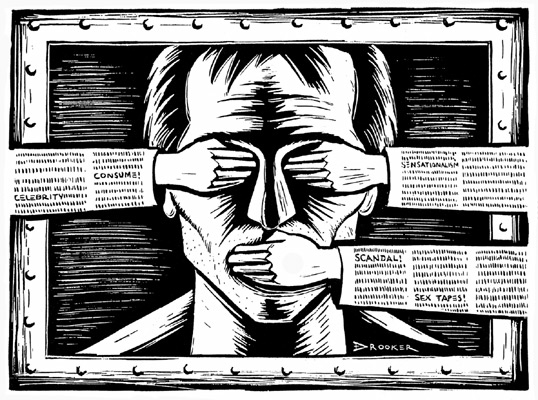The value the free press holds for our campus is particularly emphasized by our polarized political climate.
Back in November, I published an opinion piece that received strong reactions in both extremes during the election cycle.
While many students offered their support for open dialogue and the Clarion’s dedication to expression, some faculty members called for my public shame.
At first, I was less concerned as I thought it was just par for the course. I can’t please everyone. If I had an opinion everyone agreed with, I would be more worried I was some kind of X-men character than Editor.
However, this managed to go further than just civil disagreement–and that made me concerned. Not for myself, but for every student at Sinclair.
The particularly concerning element? People are free to disagree with me–but they are not free to agree.
The censorship of student journalism has been mused about amongst faculty and professors.
I don’t take that lightly, nor should any person at this college.
I was labeled ‘dangerous,’ amongst more foul commentary for the mere publication of students’ thoughts.
Several students commented on the behavior of these educators. The more worrisome part? They were disregarded entirely.
Personally, I do not mind if someone disagrees with me. Life is very boring with no meetings of the mind.
Ignoring or disliking me is fine. Ignoring, disliking and otherwise squelching the thoughts of our vast student body is significantly troubling.
Leveraging your position and power at a school to detract from expression is not compatible with our core values.
I live in and report on the uncomfortable. I am not the least bit apologetic for raising civil rights concerns.
That is an expectation and a duty of the press.
The Clarion champions the idea that journalism cannot be silent. There’s not an “if,” “and,” or “but” to it.
There’s a long history to the ways societies informally move to censor its population; one that educational bodies also participate in.
Here is my proposition: If we are a culture that cannot agree, I refuse to dissent. We, as student journalists, refuse the notion of a dissent climate.
As a student, you own your mind and the formation of your own thoughts. Your education is not to be dissent-based. You are not to only react to thoughts through a filter academia may try to force onto you.
Education is not a passive act and it is not up to someone else.
You must have an educational environment where you may speak your mind. Even more so, one where you can be wrong. You deserve that; you deserve to be heard.
There’s no stipulation or loophole to justify not providing you with that.
The consequences of a reactive pedagogy could be massive and lifelong. Surely, we want our students to be able to speak when their society requires them to act.
We can’t get caught up in the pervasive and unacademic political climate. Students can feel it. It’s potent right now.
That can take away our agency to build our own lives. We seem to say in life it’s a lot about ‘who you know’ while routinely limiting students from opportunities for them to know themselves.
If we lose that we’re not fulfilling our communities needs.
Editors of several prominent Ohio college newspapers share my feelings.
It’s not easy making a news team with campuses full of students that cannot feel they can write or think without having a lifetime of consequences from the invisible hands of university.
The Clarion is a microcosm of how the college thinks of and treats the rest of the student body.
If there is no freedom to agree, there is no freedom of the mind. If we don’t provide both, we can’t say we’re a place for education.
Nobody asks our educational institutions to be perfect, but it is precisely that grey area that necessitates a free and open press.
Barton Kleen
Executive Editor


